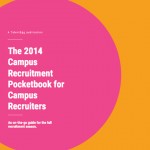Across the country, co-op students and interns are finishing their work terms, one step closer to hatching meaningful careers post-graduation.
Before they hand over their projects and turn in their security badges, commemorate their success with an egg-ceptional end of term experience.
End of term is a prime opportunity for employers to re-engage students with the brand aspects that attracted them to your organization in the first place: support for, appreciation of, and investment in Gen Y talent.
Wrapping up a work term in a positive, celebratory manner imparts a lasting impression of your employer brand on your student hires, influencing the way they view their overall work experience.
Satisfied students are more likely to consider additional work terms with your organization or apply for full-time employment once they graduate. They’ll be more likely to encourage their friends to apply to your organization too, adopting a brand ambassador role while on campus.
Recognize individual and group achievements by incorporating these ideas into your end of term plans.
End of term discussion
Exit interviews are standard practice at many organizations, giving recruiters the chance to gain valuable program insight and provide Gen Y with a platform to express their honest thoughts and opinions.
Be supportive throughout the exit interview process by giving students an opportunity to prepare for the upcoming discussion. One way to do this is by sending out a self evaluation survey–these brief questionnaires encourage students to reflect on their experience and focus their feedback. Google Forms or Survey Monkey are user-friendly options accessible from any device (perfect for tech-savvy Gen Y).
Another way to prep students for an exit interview is asking them to write a blog post summarizing their internship or co-op experience. Blogs are more casual in tone and format, giving students room to express themselves more authentically. They can also be kept on file for future use as testimonials in recruitment materials.
Set a word limit for the entry (500-700 words is a good benchmark) and publish the best blogs on your careers site for added Gen Y perspective–if students aren’t up to writing a blog post, encourage them to explore other mediums, like vlog or photo posts. You can also incorporate the resulting content into your TalentEgg profile to showcase the real, human side of your workplace.
End of term celebration
Whether you have a large cohort or a small handful of students, celebrating their time with your organization is integral to the success of your program.
Think of it this way: from recruiting to onboarding, the relationship they’ve had with your employer brand has been pretty meaningful. Skip the unceremonious goodbye with an unforgettable end of term gathering.
Off-site outings to sports games, museums, activity centres or restaurants give students one last chance to bond before heading back to campus, and boost overall brand recognition (picture a sea of branded t-shirts on the street, or a logo on a jumbotron). Office-bound receptions are also exciting, especially when food, drinks and other staff members (mentors, immediate team, executives) are involved in the festivities.
Keepsakes
Acknowledge and thank students for their time and energy with a gifted memento. Students will feel honoured, and your employer brand will be top of mind as they head back to campus.
Custom company t-shirts with program names or year are a fun way to remember the work term. Gen Y are a creative, collaborative bunch–why not involve them in the t-shirt making process? Hold a design contest in the weeks leading up to end of term, or organize a vote for the winning t-shirt phrase. Students can submit their own designs or work together in teams to come up with appropriate slogans.
Other gift ideas include: gift-cards or discount vouchers for your product or service, a photo album of the work-related activities they participated in, or a card with personalized well-wishes from staff.
Professional recommendations
Gaining skills, confidence and experience are a student hire’s main goal, but professional recommendations are also high on their work experience checklist.
At the end of their work term, student hires will reach out to their immediate team for references, but receiving an surprise recommendation from the HR team would be the cherry on top of the cake for many career-focused student hires.
” The main thing students want to see in an internship or co-op program is an opportunity to grow and gain experience, but recognizing our work is just as important.”
-Communications student, University of Guelph-Humber“Students are capable of performing meaningful work, so it’s nice when organizations align with that belief and recognize top performing interns for work well done.”
-Engineering student, University of Waterloo
LinkedIn recommendations are an effective way to honour high-performing students. Not only do they give students a professional confidence boost, they’re also a public reminder of how awesome your employer brand is. When writing a recommendation, focus on a student’s top three skills and be sure to mention their future potential. You can also endorse two or three relevant skills on the LinkedIn profiles of students who refined their abilities during their work term.
Alumni network
In today’s digital age, staying in touch is synonymous with social media. Use Gen Y friendly platforms to your advantage and connect with your student alumni.
Create a private LinkedIn group for past interns or co-op students to join. Be sure to post relevant, targeted posts to keep them engaged with your business–you can use the group as a qualified candidate pool when recruiting for future opportunities.
You can also create a hashtag that alumni can use on Twitter and Instagram when sharing photos or thoughts about their experience. Try to keep your hashtag creative and concise: using a long hashtag can be hard to read or spell (negating the use of the hashtag in the first place), and leaves less space for your alumni to write glowing feedback.
Discussion: How does your organization celebrate the end of term?






Leave a Reply
You must be logged in to post a comment.